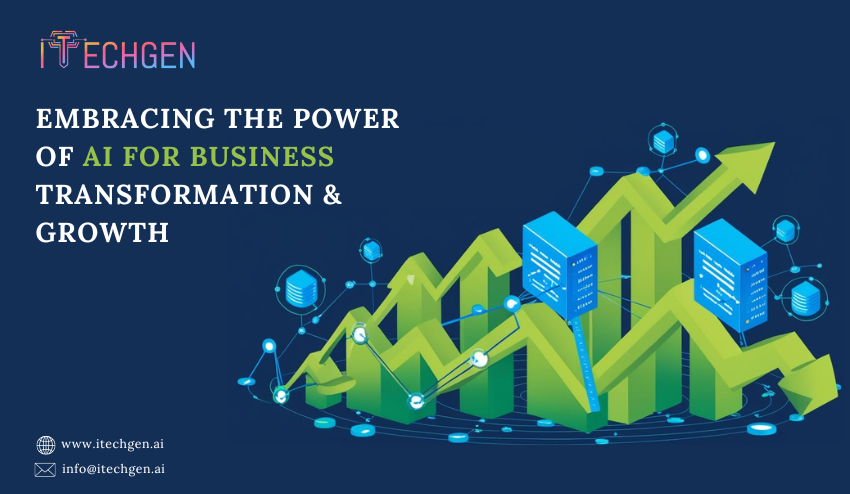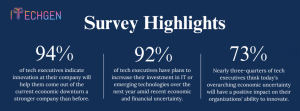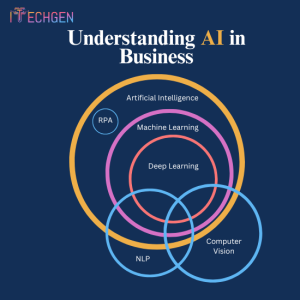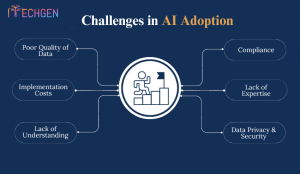
Artificial intelligence (AI) is not a futuristic concept. It is here, a powerful force reforming every aspect of the business world. In recent years, many revolutionary innovations have been seen in computation technology and algorithmic innovation that have pushed AI to new heights. These transformative changes have allowed businesses to work more efficiently, make informed decisions, and provide exceptional customer experiences.
Businesses around the globe are inclining toward AI development to automate their day-to-day activities, handle supply chains, manage large datasets, and predict future market trends. In a survey conducted by EY, 90% of participants are using AI models and 80% are planning to invest more in AI in the upcoming years. This survey speaks volumes about the success of AI in today’s competitive world.

Today’s AI advancement can change any business, irrespective of its size or shape, and open doors for a myriad of opportunities. Take the automotive business, financial institutions, healthcare facilities, construction companies, and all tech-oriented enterprises – all leverage AI. It’s time for us to adopt it and acknowledge its full potential.
This blog will provide guidance on AI integration into your business. We’ll also understand artificial intelligence and machine learning in depth and these technologies can help you gain a competitive edge in today’s tech-driven world.

Artificial intelligence is a hub of many technologies. It includes machine learning, robotics & automation, deep learning, computer vision, and natural language processing. These technologies seem related to one another but their applications are different.
Need an Image like this
let’s have a look at these AI technologies before understanding its potential in business:
Businesses can use AI to make their operations smooth and efficient. For example, you can use chatbots for customer support, sales predictions, product recommendations, boost your security systems, task automation, and more. Below are the top 6 use cases of Artificial Intelligence in business:
A report reveals that the chatbot market is estimated to reach $1.25 billion by 2025.
Chatbots are AI-based applications that mimic human-like conversations with customers using digital devices. They are designed to respond to answer customer’s queries. Customers want quick and personalized responses and chatbots provide just that. They have significantly contributed to digital growth and are considered one of the major trends in improving customer engagement and satisfaction.
Sales forecasting is important for predicting future sales for long-term business success. Businesses can easily identify future problems using sales prediction and take proactive measures to timely address them. Through accurate sales forecasting, businesses can draw an estimation of future customer purchases and predict long-term and short-term benefits.
They can implement AI-powered CRM software in their system for easy sales forecasting. It gathers all the present information like purchase data, purchase history, etc., and figures out how each data element is related to sales performance.
The AI integration into business operations has a significant impact on the trading industry. The technology allows enterprises to take part in comprehensive market research, analyze ongoing trends, and collect competitive intelligence that gives them time to modify their marketing strategies. It is a major force in driving overall growth.
AI helps businesses gain invaluable insights into their current and potential competitors through deep analysis and allows them to monitor their competitor’s activities in real-time. They can analyze their market performance and make informed decisions to stay ahead of the curve.
One of the best examples of how AI is transforming businesses is purchase suggestions. AI allows systems to suggest the ideal products to users through a comprehensive data analysis. If your customers love shopping online, AI will recommend more related products to your users. For instance, someone buying a smartphone might discover more stuff in the recommended section, such as portable chargers, phone coverings, and earbuds.
75% of customers are likely to buy products through personalized product recommendations. With the power of AI, businesses can easily influence their customers’ purchase decisions by showing them related products they might be interested in.
Cybersecurity has become vital in our modern digital age, especially for retail, healthcare, and banking sectors. Growing cyber threats like identity theft, data breaches, and illegal access are continuously aimed at these industries. Through AI-powered tools, organizations can more effectively protect themselves and keep ahead of these constantly evolving threats.
Millions of credit card companies, banking institutions, healthcare centers, and whatnot depend on machine learning technology for fraud detection. This advanced technology saves businesses from alarming risks in several ways, such as vulnerability management, prevention control, phishing detection, network security, and behavioral analytics.
Businesses use artificial intelligence to perform various routine tasks like employee attendance, data entry, invoice processing, and HR onboarding. This helps them eliminate any manual errors, offering them time to concentrate on other major tasks. Its analytics tools can help optimize supply chain demands, manage warehouse inventory, and streamline logistics. It also uses predictive analytics to predict equipment’s maintenance time to prevent disruption in services.
Unlike traditional methods, AI systems can improve quality control by monitoring visual data and identifying defects with attention to detail. It leverages performance analytics to simplify workforce management and predict staffing needs, optimize shift schedules, and boost productivity.

Adopting Artificial Intelligence in business comes with many challenges. It can only be successful if the leaders understand these challenges and take innovative measures to tackle them. Some of these challenges are:
The success of AI adoption in business heavily depends on the quality of datasets. The most challenging part is ensuring the data is relevant, sorted, and accessible. High-quality and accurate data greatly impact the functioning of AI-powered systems, whereas irrelevant or inaccurate data hinders the full potential of AI applications
Whether you’re incorporating a new AI system or upgrading an existing one, AI integration can be a costly pursuit. Multiple factors impact the implementation cost like modern infrastructure, software upgrades, and hardware integration to handle AI’s specific demands. Workflows and managing quality datasets further affect the cost of implementation especially for startups and small businesses.
A poor or limited understanding of artificial intelligence is another big challenge to its adoption. Many business owners and employees don’t have enough clarity about AI’s capabilities and benefits. This significantly causes resistance to its adoption. Concerns regarding job displacement and misconceptions that AI will entirely replace human workers further hinder its adoption.
Over the years, AI business solutions have gained immense recognition due to which regulatory bodies are implementing strict compliance standards to ensure ethical usage. These regulations are highly stringent in AI-powered systems in healthcare and finance
Adopting AI is not a piece of cake. A skilled team of AI experts, data analysts*, and ML engineers are required for its successful implementation. However, today’s market lacks such talent. It is difficult nowadays for businesses to find and retain professionals.
AI-powered applications heavily depend on sensitive data and confidential information to operate efficiently. This causes a significant concern around business security and data privacy. The risk of illegal access, data breaches, and cyberattacks is prominent in all AI processes.
The business world is changing every second and AI is at the leading position of this evolution. Artificial intelligence and machine learning have vast potential but incorporating it requires more than just technology. The right approach, mindset, and skills are necessary to bring innovation without compromising efficiency and ethical processes. By adopting a proactive approach and building a solid foundation for AI implementation, businesses can discover opportunities that once seemed unattainable.
For assistance and the right guidance, iTechGen is always here for businesses to take the right step forward to embrace artificial intelligence with confidence. We have years of experience developing AI business solutions designed to fit your unique business needs across multiple industries. Our experts take care of every aspect of AI development, be it building strategies, implementation, and support. We promise a seamless transition into the world of AI. Contact us today to discuss your project.

Pankaj Arora is the Founder & CEO of iTechGen, a visionary leader with a deep passion for AI and technology. With extensive industry experience, he shares expert insights through his blogs, helping businesses harness the power of AI to drive innovation and success. Committed to delivering customer-first solutions, Pankaj emphasizes quality and real-world impact in all his endeavors. When not leading iTechGen, he explores emerging technologies and inspires others with his thought leadership. Follow his blogs for actionable strategies to accelerate your digital transformation and business growth.
View More About Pankaj Arora